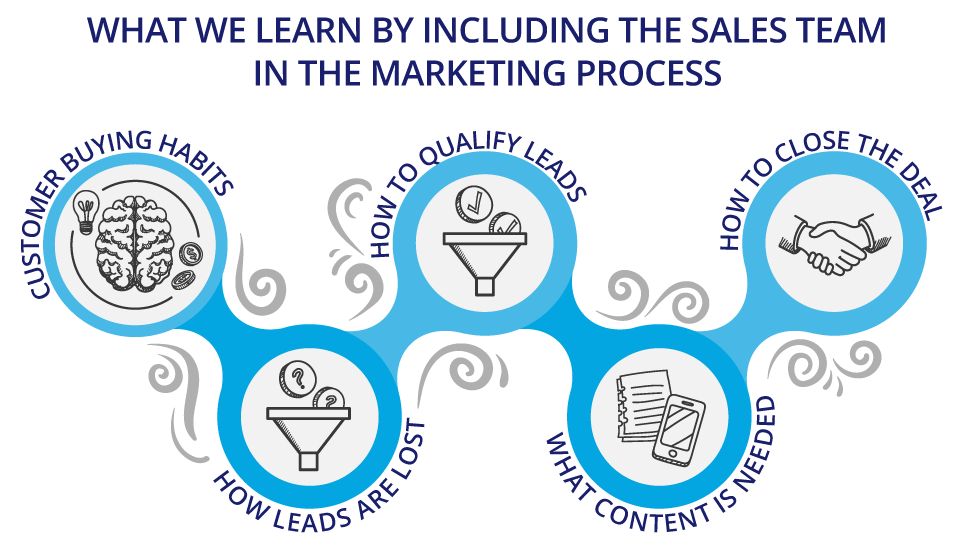How a Marketing Partner Empowers Sales Teams to Be More Effective

Sales and marketing must work together to effectively scale your business. But how do businesses without internal marketing make it happen? By finding the right marketing partner.
The expert touch
There’s a standard best practice that successful businesses espouse: hire experts for your team. However, that best practice can become a complicated mess without an all-encompassing strategy.
In each phase of business growth, new roles need to be created or filled. For a company that prioritizes customer acquisition and increased revenue, these positions mainly fall within sales and marketing departments. Sales team roles are often similar enough that there may be no need to deeply define tasks and functions outside of management, inbound sales, outbound sales and onboarding. Marketing, on the other hand, requires many technically distinct specialties that work together to create a cohesive unit.
Businesses that hire siloed freelance digital marketers, web developers, designers, writers, and other creative and technical roles find out very quickly that it’s rarely successful as a strategy. In fact, that’s when hiring individual experts can start to fall apart. Moreover, reacting to marketing needs on an ad hoc basis leaves brands with a fragmented story. Freelancers can be excellent resources for single projects, but hiring multiple contractors to do the work of a marketing department leaves your brand marketing feeling incoherent. And your audience will notice. When a marketing team consists of experts working piecemeal, you lose the throughline of your brand story, stall your lead generation system and deflate any accumulative marketing momentum.
The better scenario is to retain a marketing partner with executive-level access that manages a cohesive program and works collaboratively with your product development and sales teams to support the goals of your business.

What is a marketing partner?
A marketing partner is an external agency or studio acting as your internal marketing team. The marketing partner functions as a cohesive unit, effectively managing your entire brand. Ideally, the team lead acting as your Chief Marketing Officer, works collaboratively with sales and ensures strategic marketing to support your business goals and product development timelines.
Let’s explore how ensuring an optimal marketing partnership for your company will feed its growth. First, we’ll review the roles of each team and where they connect, where they don’t and, most importantly, where they should. Then, we’ll reveal how a marketing partner will align the goals and outcomes of sales and marketing to streamline your growth.
The teams
Sales and marketing teams often work disjointedly and in parallel with each other, only connecting at the hand-off point when marketing sends their sales approved leads (SALs) to the sales team to nurture. Not building a relationship from the start causes friction between the teams as well as duplicated work when each team tries to correct what they consider the other’s mistakes. Some sales and marketing functions overlap, and that’s where additional problems can arise. Looking at sales and marketing as a Venn diagram, you can see where they have individual processes with some areas of intersection. But unfortunately, those areas of overlap are rarely noted or refined to become mutually beneficial for sales and marketing.

To get a deeper understanding of where teams overlap and why the friction exists, we’ll review what each team is responsible for and their processes.
Sales
The sales team is out in the trenches, fully immersed in the customer landscape. Though there are differences between industries, salespeople are commonly responsible for:
- Responding to inbound and initiating outbound sales calls
- Giving presentations and demos
- Closing new deals
- Renewing contracts and upselling customers
- Networking and representing the brand publicly
In an effective sales process, sales teams reach out to qualified leads that have demonstrated an interest in the product. These SALs are guided by a sales rep through the buyer journey via calls, demos, presentations and contract signings.
Consequently, the sales team is in touch with current market opportunities and challenges, including market needs, lead objections, competitors that prospects are exploring and changes in competing solutions.
The result of close customer interaction is that sales holds significant insight into what customers want and what motivates them right now.
Marketing
Marketers focus on the strategy and delivery of assets that attract potential buyers and convert them into SALs. Marketing relies on metrics and data for long-term planning. Additionally, they:
- Develop and adjust marketing strategies
- Design and write branded content
- Manage multi-channel marketing programs
- Create sales funnel automation
- Generate quality leads for the sales team
- Measure, analyze and report on results metrics
An experienced marketing team combines its customer-centric perspective and extensive knowledge of proven marketing strategies. These tools allow them to design systems that support their ability to inspire customer loyalty, team pride and investor confidence. Using various channels, such as social media, organic search and industry advertising, the team can successfully multiply marketing ROI.
Sales and marketing belong together
We often see companies with independently functioning salespeople and marketers. In these enterprises, teams only connect in a hand-off situation when the marketer provides deliverables to sales without high-level strategic collaboration.
As discussed, sales is privy to current customer, competitor and industry data. On the other hand, marketing is knowledgeable about where those customers engage and what types of content they are most interested in.
It stands to reason that these teams could be a powerhouse if they worked together. Yet this is not often the reality.
Why do sales and marketing have trouble aligning?
According to Seismic, “70 percent of the content that is created by marketers goes unused by sellers.” In the same article, the Aberdeen Group is quoted as saying, “78 percent of executive buyers claim salespeople do not have relevant materials.” These statistics are clear indicators that there is a real communication breakdown around content relevance.
Leaders commonly create this issue when assigning individual projects to multiple siloed professionals. For example, a specialist hired to complete one small piece of the marketing program is limited by a lack of access to sales (and, incidentally, product development and business planning). Further, many contractors don’t consider sales intel valuable or don’t know how to effectively use it to enhance their work.
Another strong point of friction between marketing and sales is lead quality. Marketing may have an excellent strategy to deliver leads to sales, but sales may not consider them SALs. Instead, sales thinks they’re marketing qualified leads (MQLs), those who have engaged with your company and could become SALs if nurtured correctly. An MQL becomes an SAL once they’re ready to talk to the sales team. So if the sales team doesn’t see the lead as an SAL, they may disregard them. In fact, according to the TAS Group, 50 percent of leads marketing sends to sales get ignored. Nonexistent communication between teams perpetuates this problem.
Executives and the desire to protect intellectual property can foster misalignment and lack of communication. For example, suppose leadership doesn’t understand the value of sales and marketing data sharing or fears disclosing trade secrets. In that case, they tend to block the exchange—particularly with external contractors.
Clearly, sales and marketing have trouble aligning due to a lack of communication and information. Luckily, a trusted marketing partner can proactively prevent these issues.
The fix
We’ve identified two primary sources of sales and marketing conflict (content relevance and lead quality) and discussed where the teams don’t align, but how do they get in sync?
That’s where your marketing partner comes in. First, the team of professionals you hire will learn about your business, products, services, mission and values. Each of these contributes to your brand and how it gets developed. Then, that deeper learning creates the building blocks for targeted cross-functional team support.
Second, you need to ensure your sales team is willing to support the effort.
Ensure sales buy-in
Sales teams, particularly those without a marketing counterpart, will benefit from improvements in their sales process—from communication automation to digital sales literature.
The best way to get your sales team on board with updated or adapted systems is to include them in the process. Mindspin, for example, ensures that both its marketing team and your sales team share goals and communicate, resulting in a collaborative effort where each stakeholder is invested in the process.

A good marketing partner will take the lead when determining any holes in the sales process via sales team interviews and auditing sales data. For example, what are the customer buying habits? How many leads are falling through the cracks? Do the lead qualification models need to be revamped and further segmented? What marketing content does sales need to close the deal? Knowing where sales needs additional support tells us exactly where we can focus to ensure the sales team is on board.
These are just a few ways a marketing specialist will dig deeper into your processes to uncover any issues that need to be resolved to establish a positive and reciprocal relationship between marketing and sales.
Once that happens, you’ll see a dramatic improvement in your sales and marketing ROI.
Can a marketing partner really make that happen?
Of course! But it’s essential to find the right one for you.
An established marketing partner brings a wealth of knowledge and experience to your business and is adept at devising and establishing precise processes that work across the organization.
Strategy
With an increased understanding of your brand through team collaboration, a marketing partner develops marketing strategies designed with your business and customers in mind.
An experienced agency understands that a marketing strategy must also support the sales process, including generating, retaining and nurturing leads through the sales funnel. Open communication prepares sales and marketing for alignment on buyer personas, behaviours, motivations and pain points—all critical to strategy.
Additionally, the sales team can be coached on ideas they can contribute toward corporate white papers and creating content for their social profiles or guest articles. A powerhouse team indeed.
Research and analytics
Your marketing partner gathers customer data and analytics from campaigns and sales team reports. This includes data based on audience engagements, social listening, survey feedback, sales presentation reports and buyer interactions.
As a result, the marketing team is empowered to fine-tune existing lead generation and sales processes or create new ones. In addition, businesses benefit from the data by gaining detailed feedback on what customers want. Now they have a richer understanding of their target audience and can adjust their business or product development as necessary.
Quality lead generation
Partnering with a marketing specialist means your marketing investment is optimized for maximal generation of quality leads.
Defining qualified leads is essential to feeding your sales team with high-value prospects that are more likely to convert. When sales and marketing agree on what makes a lead hot, they can create workflows and targeted content for different scenarios. For example, when a deal falls through in the final stages of the funnel, does the lead go back to marketing, or does it stay with sales in their nurturing stream? A lead can run hot, cold or lukewarm at any time in the customer journey. A high-level, holistic marketing program seamlessly transitions leads between sales and marketing, and you can be confident your leads are in the right hands exactly when they need to be.
Sales effectiveness
A marketing partner who is motivated to grow your business wants to improve the effectiveness and efficiency of your sales systems and processes.
This applies to everything from ensuring that your sales team has relevant and organized sales literature to automating their sales workflow. It also includes ensuring that sales isn’t unnecessarily replicating what marketing has already accomplished.
For example, how many emails and which PDFs did a lead view during the lead generation journey? Sales should know to prevent them from sending too many, too few, or repetitive emails and brochures.
No matter where your prospects are in your pipeline, integrated sales systems managed and supported by your marketing partner ensure they are effectively nurtured.
A true partner
Because Mindspin functions as your partner, we have a vested interest in understanding your sales team’s needs and finding ways to empower them to be more effective. We combine the product, pricing and even geographical challenges your company faces, look at them through the lens of your business growth plans and use that picture to create better marketing outcomes.
The dream team
Brand trust and loyalty, customer retention, sales growth, and year-over-year revenue increases can be better achieved by an informed marketing partner working with sales toward a unified goal.
Aligning sales and marketing just makes sense. How you do it could mean the difference between a low-return sales effort and a highly effective dream team.
Tanja Groos, Founder and Director, Mindspin® Studio Inc.
Tanja Groos is a Founder and Strategy Director with more than 25 years of experience in branding and digital marketing. She has a strong background in developing and implementing marketing strategies, gained from collaborating with leaders and managers in consultative and service-based industries. Her efforts have tripled sales, surpassed top industry competitors online, and enhanced brand credibility for her clients.
Tanja’s award-winning branding work and marketing insights have been featured in national showcases and publications like “The Hamilton Spectator” and “Identity Solutions.” She received the Entrepreneurial Recognition Award from the Government of Canada. Tanja is passionate about helping people connect with services that enhance their lives and guiding readers in achieving their business growth dreams by explaining how marketing gets them there.
Follow Tanja on LinkedIn












